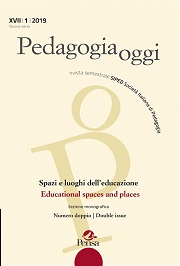Cronotopi dell’educazione inclusiva
Abstract
La storia sociale dell’inclusione è storia che si gioca intorno alla concessione,
rivendicazione, conquista e trasformazione di spazi – fisici e relazionali – negati. Così può
essere letta, da un punto di vista pedagogico-didattico e legislativo, anche la storia
dell’inclusione scolastica italiana e che oggi ci consegna la sfida di ripensare
costantemente le forme dell’educazione inclusiva volte a individuare risposte specifiche,
in spazi comuni, a un’ampia varietà di bisogni educativi. Per sfuggire alla tensione
omogeneizzante a cui spesso conduce la tendenza semplificatoria della categorizzazione
delle differenze, lo spazio necessita di essere pensato nella sua intima connessione con il
tempo in cui si realizza l’evento educativo. A tal fine, sulla scorta della nozione di
“cronotopo”, mutuata dagli studi di Bachtin sul romanzo e adattata alla riflessione
sull’insegnamento-apprendimento, il contributo mira a identificare quali cronotopi
meglio possono accogliere un’istanza inclusiva. In particolare si argomenterà che il
cronotopo, sullo sfondo dell’approccio dialogico bachtiniano, potrebbe rappresentare un
supporto per il superamento di una visione additiva degli spazi a favore di una visione
relazionale e trasformativa degli stessi.




